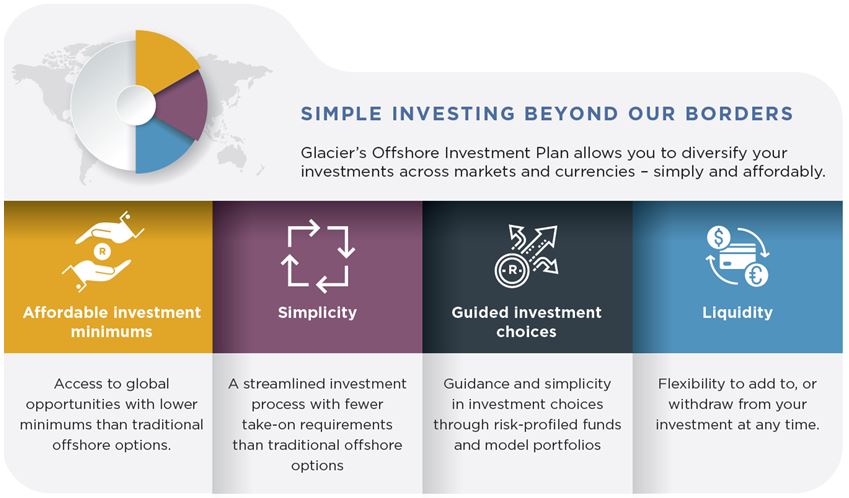Investing Off Shore: How Political Stability Affects Investment Success
Wiki Article
Discovering Exactly How Investing Off Shore Works: A Comprehensive Overview
Investing offshore offers an intricate landscape of chances and difficulties. Recognizing the different kinds of overseas accounts is essential for any person considering this course. The benefits, consisting of enhanced personal privacy and property defense, are substantial. Legal and tax effects warrant mindful attention. As capitalists seek to maximize their profiles, the steps to establish a feasible offshore investment technique come to be vital. What are the crucial elements that a person must navigate to do well in this endeavor?Recognizing Offshore Accounts and Their Kinds
What drives people and companies to consider offshore accounts? The allure of financial privacy, property security, and potential tax advantages typically draws in the attention of those seeking to handle their wide range more tactically. Offshore accounts, normally developed in international jurisdictions, can be found in different forms. Individual accounts accommodate specific demands, offering services like cost savings, financial investment, or retirement planning. Organization accounts, on the other hand, offer firms seeking to promote worldwide purchases, boost privacy, or optimize tax responsibilities. Trust fund accounts give an extra layer of protection, enabling individuals to secure their possessions for future beneficiaries. Each sort of overseas account presents unique functions, commonly affected by the regulative environment of the host nation. Recognizing these differences is essential for services and people, as the option of account kind can especially impact their economic approaches and compliance with worldwide laws.Benefits of Offshore Spending
While lots of capitalists seek chances to diversify their portfolios, offshore investing presents distinctive benefits that can improve financial growth and protection. One notable benefit is the capacity for possession protection. Offshore accounts can guard financial investments from political instability or economic declines in the financier's home country. In addition, offshore investments typically supply access to international markets, permitting investors to use emerging economic situations and sectors that may not be readily available domestically.Another considerable benefit is tax obligation performance. Many offshore jurisdictions use favorable tax routines, which can lessen tax obligations and boost total returns. Overseas investing can boost privacy, as specific jurisdictions impose stringent privacy laws.Lastly, offshore accounts can help with wide range monitoring approaches by providing a larger variety of financial investment choices, consisting of alternative properties such as real estate and products. Jointly, these benefits make offshore investing an enticing option for those aiming to reinforce their economic profiles.
Governing and lawful Factors to consider
Guiding through the lawful and regulative landscape of offshore investing calls for careful interest and understanding. Investing Off Shore. Investors must browse an intricate web of regulations that vary significantly from one jurisdiction to another. Conformity with local guidelines is vital; failure to do so can cause severe charges, consisting of penalties and jail time. Furthermore, recognizing the legal frameworks regulating foreign financial investments is vital for assuring the security of possessions and keeping functional legitimacy.Key factors to consider include comprehending the governing needs for developing overseas entities, such as corporations or depends on, and sticking to anti-money laundering (AML) and know-your-customer (KYC) regulations. Financiers should likewise be mindful of reporting obligations in their home nation, as several countries require disclosure of overseas holdings. Involving with attorneys experienced in offshore investment can give indispensable advice, aiding capitalists to alleviate threats and secure conformity with applicable laws and policies while maximizing their financial investment capacity

Tax Effects of Offshore Investments
Understanding the regulative and lawful factors to consider of overseas investing naturally causes an examination of the tax obligation effects connected with these investments. Offshore financial investments can supply significant tax advantages, including minimized tax obligation prices and the possibility for tax deferral. Investors should navigate complex tax policies in their home countries, as several jurisdictions require taxpayers to report foreign earnings and assets.For U.S. citizens, the Foreign Account Tax Compliance Act (FATCA) navigate here mandates the reporting of offshore accounts, while other nations have comparable requirements. Failing to conform can cause serious penalties. In addition, particular overseas funds may go through distinct tax treatments, such as Passive Foreign Investment Firm (PFIC) guidelines, complicating financial investment strategies.Investors ought to take into consideration consulting tax obligation specialists to recognize ramifications particular to their scenarios and assurance conformity with both worldwide and domestic tax obligation laws, eventually making best use of the benefits of their overseas investments while minimizing threats.Actions to Get Began With Offshore Investing
Lots of capitalists seeking to diversify their portfolios transform to overseas investing as a sensible choice. To start, one need to conduct thorough research study on possible offshore territories, considering factors such as regulatory atmosphere, tax, and financial investment possibilities. Investing Off Shore. After choosing an ideal place, capitalists should develop an offshore account, which typically needs paperwork proving identification and resource of funds.Next, capitalists often engage with an offshore investment or an economic advisor firm knowledgeable about regional legislations and market characteristics. This collaboration can assist in crafting a customized investment technique that aligns with private goals and run the risk of tolerance.Once the method remains in location, investors can proceed to my blog pick particular properties or funds for investment, guaranteeing they evaluate performance and takes the chance of on a regular basis. Ultimately, keeping conformity with both regional and home nation guidelines is crucial for successful overseas investing, requiring ongoing persistance and possibly routine examinations with lawful specialistsFrequently Asked Questions
Exactly how Do I Select the Right Offshore Territory?
Picking the best offshore jurisdiction includes examining aspects such as regulative atmosphere, tax advantages, political stability, and ease of operating. Researching each option completely guarantees informed decisions that align with individual investment goals and risk tolerance.What Sorts Of Assets Can I Hold Offshore?

Exist Dangers Connected With Offshore Spending?
The threats connected with overseas investing include lawful complexities, regulative changes, money variations, and Visit Your URL possible political instability. Investors need to thoroughly examine these variables to mitigate threats and guarantee conformity with international legislations and guidelines.Just How Can I Gain Access To My Offshore Finances?
To access overseas funds, individuals usually require to call their economic organization, offer essential recognition and paperwork, and follow established protocols for fund transfers, making certain conformity with both worldwide and regional guidelines regulating overseas financial investments.
What Are Common Misunderstandings Regarding Offshore Accounts?
Usual misconceptions concerning offshore accounts consist of ideas that they are entirely for tax obligation evasion, absence of guideline, or just easily accessible to the wealthy. In truth, they can be reputable monetary tools for varied individuals. Additionally, overseas financial investments commonly give accessibility to worldwide markets, enabling financiers to touch right into emerging economies and markets that might not be available domestically.Another substantial benefit is tax effectiveness. Offshore investing can boost personal privacy, as specific jurisdictions impose strict discretion laws.Lastly, overseas accounts can facilitate wealth administration strategies by giving a wider array of financial investment choices, consisting of alternative possessions such as genuine estate and commodities. Understanding the legal and regulatory considerations of offshore investing normally leads to an evaluation of the tax effects connected with these financial investments. Offshore investments can use significant tax obligation advantages, including minimized tax rates and the potential for tax obligation deferment. After picking a suitable area, investors need to develop an offshore account, which generally requires documentation verifying identification and resource of funds.Next, investors usually engage with a monetary expert or an offshore financial investment firm acquainted with local regulations and market dynamics.Report this wiki page